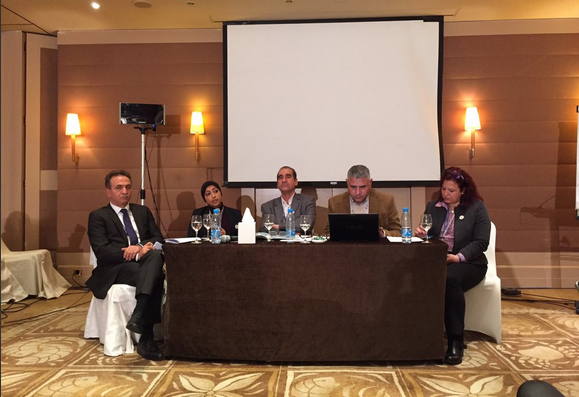Feature image: Panel of workshop “Freedom of Expression on the Internet in the Arab Region and Their Impact on Human Development”
“70% of opinion prisoners in the Arab world are imprisoned on charges of unlawful Internet use. 70% of those are prosecuted because of social media content.”
55% of the 175 million internet users in the Arab world are located in Egypt and Saudi Arabia, which means that a substantial chunk of the world’s web surfers are based in relatively conservative countries. This presents some difficulties on their digital freedom of expression, as social media is closely monitored in these countries. For instance, someone could go to prison for eight years for as little an action as liking the wrong post on Facebook, and someone has, in Saudi Arabia.
This is precisely the type of imbalance that Workshop 12 of Arab IGF 2015 addressed. Entitled “Freedom of Expression on the Internet in the Arab Region and Their Impact on Human Development”, the session discussed the fact that more and more internet activists are being summoned to court. For example, an employee in downtown Beirut took a picture of a red carpet lain out for a grand opening that would be attended by the Minister of Tourism, jokingly inviting people to walk on it. The next day, he was visited by members of the Lebanese Armed Forces and transferred to another branch of his workplace.

Bahraini Human Rights activist, Maryam Al-Khawaja, was present on the panel, and told the story of how she had been arrested for allegedly “assaulting a police officer” whom she hadn’t even touched, as a cover for prosecuting her Internet activism. She was tried on several charges in insulting the king online. She pointed out how cunning it was to keep offenses like “insulting the king”, so vague, as it would allow authorities to construe whatever they like as a crime. In response to similar cases, she has launched a campaign called Wanted for Justice, which advocates for the rights of people tortured for speaking their minds, and calls for the investigation and accountability of the people responsible.
Next, Dr. Khaldoun Farhat, CEO of Terranet, explained that Internet Service Providers, or ISPs, are purely “pipes” connecting users to the Internet, and which take the side of users in case of any problem. “Internet is clearly related to human development”, he said, asserting that in order for the Arab world to become more advanced compared with the West, is partnerships between stakeholders, the government, the private sector, NGOs, and academia. Eventually, these partnerships would facilitate the regulation of Internet access and people’s digital rights, as well as achieving higher internet speeds, so that the Arab world can finally benefit from easier web access and usage.
Finally, the Q&A portion of the workshop clarified one think quite notably: there is only so much Human Rights activists can do. NGOs can’t defend people they don’t know about, nor can they get the responses they need when there is no media law to help them advocate for Internet users, etc. It hence seems we have a long way to go when it comes to digital rights and privacy.


